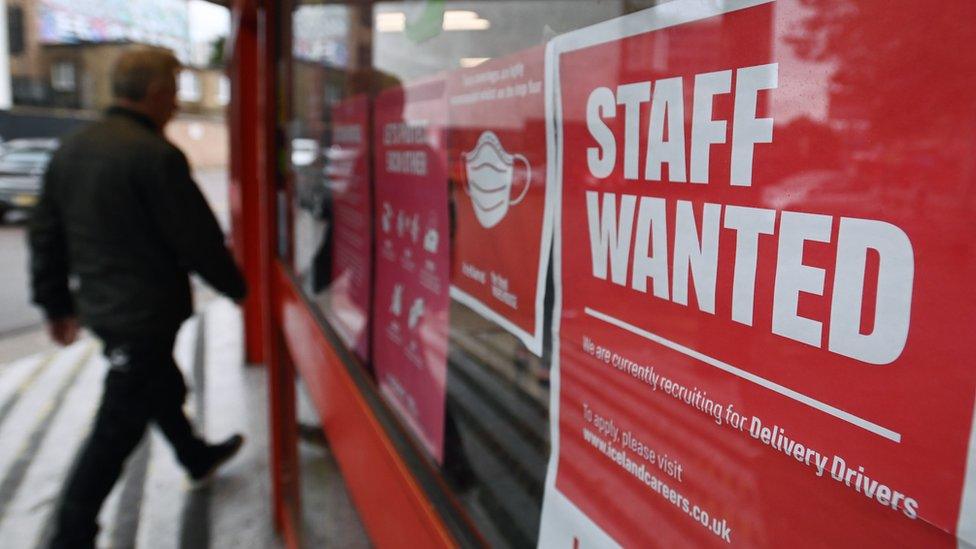Student finance: Remote learners left out of maintenance loan plans
- Published

More students will be able to access loans in an overhaul to England's student finance system - but remote learners will not get maintenance help.
The government has confirmed plans to allow people to access loans worth the equivalent of four years of post-18 education (£37,000 in today's tuition fees) throughout their lives.
It says the lifelong loan entitlement (LLE) will make courses more flexible.
But maintenance loans will be available only for in-person courses.
Currently, student finance for higher education in England is designed mainly to provide tuition-fee and maintenance loans for three-year undergraduate degrees. Education is devolved, so student finance is different in different parts of the UK.
What is lifelong loan entitlement?
The new plans involve splitting courses up from 2025, so that people can get loans to study university and college courses a module at a time, or part-time.
It is hoped the lifelong loan entitlement will help people balance training or studies alongside other commitments, such as childcare.
Details announced on Tuesday include:
People can borrow money through the LLE from the age of 18 up to 60
Maintenance loans will be available for more technical and part-time courses, to help people fund their living costs while they are studying - but only for in-person courses
First loans will be available in 2025, for modules of technical qualifications at levels 4 and 5, external (between level-3 A-levels/BTecs and level-6 degrees). Modular funding for more qualifications - including some university degrees - will come in 2027
Repayments will work in the same way as the current system. Payments will start only once graduates are earning more than the repayment threshold.
Students can get a loan whether or not they have already been to university. For example, graduates of three-year degrees will still be entitled to one year's worth of tuition-fee loan, which could be used to fund a short course or a set of modules. Details on how individual loan entitlements are calculated will be released in the autumn, the government says.
Graduates will also be able to secure a loan to study an equivalent or lower-level of qualification than they already have, which is currently not allowed.
How much the LLE plans will cost and how they will be funded will be set out in the next government Spending Review, which is not expected to be until 2024.
Some groups are concerned about how the system will work.
Prof Tim Blackman, vice-chancellor of the Open University, said the absence of maintenance loans for distance learners - those who choose to do a course remotely - was a "major inequity" in plans.
"We know at the OU that maintenance loans make a difference to whether a student is able to study, and currently, we are seeing many of our students abandon their study because they need to prioritise working more hours or paying other bills," he said.
"These are the very people who often stand to benefit most from higher education because they have faced disadvantages earlier in life, or want to move into more highly-skilled jobs, including in our public services."
The Open University says it taught 47% of the UK's part-time undergraduates in the academic year 2020-21.
Ann-Marie Spry, vice-principal at Luminate Education Group, said the LLE would be "vital" for "evolving skills needs" but that plans must be joined up with the rest of the education system.
She said better investment was needed for level-3 courses "to create the pipeline of students for this initiative".
Nick Hillman, director of the Higher Education Policy Institute think tank, said the loans would "help open up education", but that factors such as insufficient childcare might continue to prevent some people from taking up studying.
Tuesday's announcement comes after a landmark review in 2019 suggested ideas to provide better value for money in higher and further education.
Legislation, external to change the student-finance system is currently going through Parliament.

Are you a remote learner? How do you feel about these plans? Email haveyoursay@bbc.co.uk, external.
Please include a contact number if you are willing to speak to a BBC journalist. You can also get in touch in the following ways:
WhatsApp: +44 7756 165803
Tweet: @BBC_HaveYourSay, external
Please read our terms & conditions and privacy policy
If you are reading this page and can't see the form you will need to visit the mobile version of the BBC website to submit your question or comment or you can email us at HaveYourSay@bbc.co.uk, external. Please include your name, age and location with any submission.
Related topics
- Published24 February 2022

- Published28 January 2022

